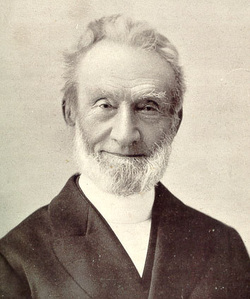
Born Johann Georg Ferdinand Müller (often spelled Mueller) in a small village near Halberstadt in what is now Germany, Müller’s early life was marked by its absence of faith. It is said that he stole from his father, and that at 14, while his mother was dying, he spent the time drinking and playing cards with his friends.
But Müller's father encouraged him to take a religious education and while studying divinity at the University of Halle, Müller began to seriously read the Bible and was converted. He soon desired to be a missionary and began preaching regularly in churches in and around Halle.
In 1829, Müller travelled to London and worked in a number of church-related positions including serving as a minister, although in 1830 he renounced his salary for that position and began what would be a lifetime of trusting God for his needs and the needs of his phenomenally productive work.
Müller founded the “Scriptural Knowledge Institution for Home and Abroad” to assist Christian schools and missionaries. Through this institution he successfully distributed over 285,000 Bibles, one and a half million New Testaments and almost a quarter of a million tracts and also established a number of Christian schools and orphanages. He received no church or government support for this work and accepted only unsolicited gifts, but his organization received and used well over one million pounds (around 90 million pounds - or some 155 million US dollars - today).
Beginning in 1836 Müller and his wife organized their own rented home to receive orphaned girls and then began to add more homes as dedicated orphanages for boys and girls. Eventually he ran five orphans’ homes which cared for over ten thousand orphans during his lifetime. Müller also established 117 Christian schools which taught over 120,000 children, many of whom were orphans.
Throughout all this Müller never appealed for financial help, nor went into debt, but continually asked God in faith for the things needed. It is known that many times unsolicited gifts of food and other supplies would arrive right at the time they were needed. On one documented occasion, Müller gave thanks for breakfast with all the orphan children sitting at the tables, although he had no food to give them. As he finished praying, the local baker came to the door with a gift of sufficient bread to feed everyone, and a local milkman also arrived with a large amount of fresh milk because his cart had broken down right outside the orphanage. These and every other gift accepted by Müller – down to the smallest quarter penny – were carefully noted down, and the records of what was received and spent were made available for public scrutiny.
Müller also accomplished a great deal of missionary work in over thirty countries – as widely scattered as Egypt, China, Australia and the United States. His efforts remain an inspiration to anyone who is willing to look at the good he was able to effect with virtually nothing but trust; and his accomplishments challenge us to ask ourselves what we might accomplish in our lives through faith.
 RSS Feed
RSS Feed
